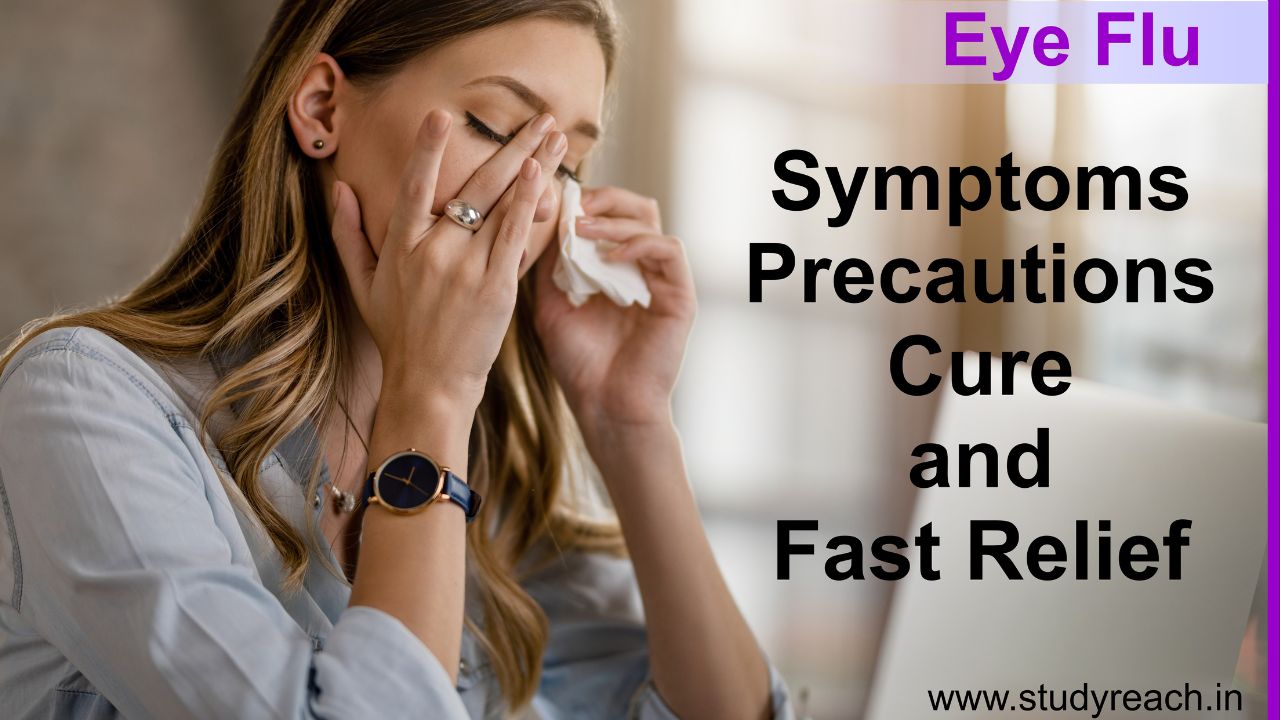Eye Flu: Symptoms, Precautions, Cure, and Fast Relief

In today’s fast-paced world, health concerns can often disrupt our daily routines. One such concern that has caught the attention of many is “Eye Flu.“ If you’re wondering whether you can study in Eye Flu or looking for information on its symptoms, precautions, cure, and ways to find fast relief, you’re in the right place. We have compiled a comprehensive guide to help you understand, prevent, and manage this condition effectively.
Understanding Eye Flu
Eye Flu, also known as viral conjunctivitis, is an infectious eye condition caused by various viruses. It is highly contagious and spreads through direct contact with an infected person’s eye secretions or objects they’ve touched. The condition primarily affects the conjunctiva, the thin clear tissue covering the white part of the eye and the inner surface of the eyelids. The infection may arise from adenoviruses, herpes simplex viruses, or other viral sources.
Table of Contents
Symptoms of Eye Flu
Eye Flu Symptoms is crucial for early detection and prompt treatment. Some common symptoms include:
Redness and Irritation
One of the earliest signs of Eye Flu is redness in the eyes. They might appear bloodshot and feel itchy and irritated.
Excessive Tearing
Tear output may increase if you have eye flu, so pay attention. Uncomfortable feelings frequently accompany excessive crying.
Discharge from the Eyes
Eye Flu can lead to a discharge that is usually clear or slightly thick. This discharge can cause crusting, making it difficult to open your eyes in the morning.
Sensitivity to Light
Experiencing sensitivity to light, also known as photophobia, is another common symptom. Bright lights might cause discomfort and even pain.
Gritty Sensation
Some individuals describe feeling a gritty sensation in their eyes, as if there’s sand trapped inside.
Swelling of Eyelids
Swelling of the eyelids and the conjunctiva is not uncommon during an Eye Flu infection.
“Can I study during conjunctivitis?”
While it’s possible to study during conjunctivitis, it’s advisable to prioritize rest and recovery. Limiting screen time, practicing good hygiene, and following medical advice can help ensure a quicker and more comfortable healing process.
Understanding Eye Flu Treatment
When it comes to treating Eye Flu, it’s important to address both the symptoms and the underlying viral infection. A combination of home remedies and medical interventions can significantly improve your comfort and help you recover more quickly.
Hygiene and Self-Care
Maintaining proper eye hygiene and practicing self-care can play a crucial role in managing Eye Flu:
Clean and Gently Wipe the Eyes
Use a clean, damp cloth to gently wipe away any discharge from your eyes. Avoid rubbing your eyes, as this can exacerbate irritation.
Frequent Hand Washing

Regularly wash your hands with soap and water, especially after touching your eyes. This can help prevent the spread of the infection.
Avoid Contact Lenses
During the course of the infection, refrain from wearing contact lenses, as they can worsen discomfort and delay healing.
Warm Compresses
Applying a warm, damp cloth to your closed eyes can help relieve discomfort and promote the natural drainage of any discharge.
Over-the-Counter Remedies
Several over-the-counter remedies can provide relief from Eye Flu symptoms:
Artificial Tears
Using lubricating eye drops (artificial tears) can help soothe dryness, redness, and irritation.
Antihistamine Eye Drops
Over-the-counter antihistamine eye drops can help reduce itchiness and discomfort caused by allergic reactions.

Pain Relievers
Non-prescription pain relievers, such as ibuprofen or acetaminophen, can help alleviate pain and reduce inflammation.
Medical Interventions
In more severe cases or when home remedies aren’t sufficient, medical interventions may be necessary:
Prescription Medications
Antiviral eye drops or ointments prescribed by a healthcare professional can help shorten the duration of the infection.
Steroid Eye Drops
In cases of severe inflammation, your doctor may prescribe steroid eye drops to reduce swelling and discomfort.
Doctor’s Guidance
It’s crucial to consult a healthcare professional for proper diagnosis and treatment recommendations. Follow their advice closely and attend follow-up appointments as needed.
Preventing Spread and Recurrence
Taking steps to prevent the spread of Eye Flu and reduce the likelihood of recurrence is equally important:
Isolation
During the active phase of the infection, avoid close contact with others to prevent spreading the virus.
Disinfection
Regularly disinfect surfaces and objects that may have come into contact with your eye secretions.
Personal Items
Avoid sharing personal items such as towels, linens, and cosmetics to prevent transmission.
Seeking Medical Attention
If you experience severe symptoms such as intense pain, worsening vision, or prolonged discomfort, seek medical attention promptly. These could be signs of a more serious complication that requires immediate intervention.
Precautions to Take
Preventing the spread of the eye flu requires a few precautionary measures:
Can I go to school with an eye infection?

It’s generally best to avoid school if you have an eye infection to prevent spreading it to others. Eye infections like conjunctivitis can be highly contagious and easily transmitted in close-contact settings. Staying home allows you to recover fully and reduces the risk of infecting classmates. Consult a healthcare professional for guidance and clearance before returning to school to ensure the infection is no longer contagious. Your health and the well-being of others are top priorities.
Hand Hygiene
Regularly wash your hands with soap and water, especially after touching your eyes or coming into contact with someone who might have the infection.
Avoid Touching Eyes
Try to avoid touching your eyes with your hands. If you need to, make sure your hands are clean and sanitized.
Use Separate Towels and Linens
Use separate towels, linens, and other personal items to prevent the spread of the infection.
Isolate Yourself
If you suspect you have the eye flu, it’s best to stay home from work or school to avoid spreading it to others.
Disinfect Surfaces
Regularly clean and disinfect surfaces that might have come into contact with the infected person’s eye secretions.
Disinfect Surfaces
If most people are infected with the eye flu, as it is highly contagious and spreads through direct contact with an infected person’s eye secretions, we would suggest you ,wear Normal glassess just for safety.
Cure and Relief
While Eye Flu is a self-limiting condition that typically clears up on its own within a week or two, there are ways to find relief from the discomfort:
Artificial Tears
Using over-the-counter artificial tears can help soothe the irritation and keep your eyes moisturized.
Cold Compresses
Applying cold compresses over closed eyes can reduce redness, swelling, and discomfort.
Avoid Contact Lenses
During an Eye Flu infection, it’s advisable to avoid wearing contact lenses, as they can exacerbate the symptoms.
Hydration and Rest
Staying well-hydrated and getting adequate rest can aid in faster recovery.
Wear Sunglasses
Manage to wear dark glass Goggles to avoid direct light and it will help to avoid yourself in regularly touching of eyes.
Fast Relief Tips
If you’re looking for quick ways to alleviate Eye Flu symptoms, consider these tips:
Chamomile Tea Bags
Placing cool, damp chamomile tea bags on your closed eyes for about 15 minutes can help relieve irritation.
Cucumber Slices
Chilled cucumber slices placed on your eyelids can offer a soothing sensation and reduce puffiness.
Lubricating Eye Drops
Preservative-free lubricating eye drops can provide instant relief from dryness and discomfort.
Avoid Irritants
Stay away from smoke, dust, and other irritants that might worsen your symptoms.
In Conclusion :
Understanding Eye Flu, its symptoms, precautions, cure, and relief methods is essential for maintaining good eye health. By practicing proper hygiene and taking necessary precautions, you can significantly reduce the risk of contracting or spreading this infection. If you’re experiencing severe symptoms or prolonged discomfort, it’s recommended to consult a healthcare professional for appropriate guidance and treatment.
Remember, your eye health is a crucial aspect of your overall well-being. By staying informed and proactive, you’re taking the necessary steps to protect and preserve your precious vision.
What are the common symptoms of Eye Flu?
Symptoms of eye flu, also known as viral conjunctivitis, include redness, itching, excessive tearing, discharge, sensitivity to light, a gritty feeling, and swelling in the eyelids.
What are the risks of eye flu, and what precautions should I take?
Eye flu is very contagious and spreads through direct contact with infected secretions in the eyes। To stop it from spreading, wash your hands regularly, avoid touching your eyes, use different towels, and stay isolated if you suspect an infection.
What can I do to quickly get rid of eye flu pain?
Wrap chilled cucumber slices or chamomile tea bags on closed eyes for a quick relief. Also, avoiding irritants and lubricating eye drops without preservatives can provide instant comfort.













